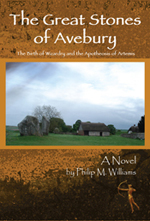
 |
Why I Wrote This Book or How an Essay Became a Romance
The twentieth century's conviction about man's evolution to a higher state centered upon literacy rather than upon language. For historians we had no history before we could read and write. We were prehistoric man. Stone Age and early Bronze Age man, who were illiterate, and therefore considered ignorant, were "primitives". Historians did recognize that some men and women of prehistoric time were unique. Those unusual men and women became both marvelous and mythical. This conceptual preamble to modern man swept us children of the early twentieth century into a romantic past, where dragons chattered with giants, and elves lunched with fairies. Oh happy day to sit down with the brothers Grimm, or with Jason, Medea, and the Golden Fleece, or with Odysseus and the Cyclops, or with King Arthur and Excalibur. None were real, but all were interesting.
In contrast to the premise of historians, many archeologists realized that man evolved. He did not spring fully empowered from the pages of the Holy Bible and other original written documents. Historians, rather than searching for kinship with our forbears, stretched to identify our differences from apes, birds, and fish. Literacy was the gold standard of modernity. Historians did grant that hieroglyphics were enough to stamp man as modern. Yet, for the most part, archeologists who were skeptical that modern brains flowered only under the sharp-pointed pen were closeted, like us kids, in the ivory tower of irrelevance. Museums were their elysian fields. Go with your white shoes, your pith helmets, and your trowels to your digs. Leave us scientists alone. Ho hum. Don't bother us about evolution.
Times have changed. We now marvel that our present actions, thoughts and emotions are choreographed by our evolutionary past. As the century wore on, archeologists outflanked the historians. First they used economists to trace trade goods and distant trade routes. Then it was city planners to understand the nuances of long dead cites such as Babylon and Knossos. Soon cracks appeared in the dictum that one must look back toward modern "primitives" if one wishes to learn about the nature of our ancient "primitives".
The so-called modern primitives retained their primitive condition unsullied by the taint of modern life. They were "saved" by their geographic isolation. In contrast, the ancients or' leaped geographic boundaries with a web of trade routes, trade goods, coinage, and immigration. Some anthropologists made good money through the absurdity that present primitives could show us what ancient primitive life was all about. These anthropologists pursued their fallacies even though modern primitives had little in common with our ancient primitives; neither a common root language nor a cosmopolitan outlook. It was a case of yokels studying yokels, peering from under their arm-pits with near-sighted eyes, wondering how history had passed them by. It makes more sense to study present civilized man in order to learn about our past. The present hunter gatherer no longer wanders the veldt: They get the same surge of joy and satisfaction by shopping BEST BUY, or the food mart. Rather than munch berries on the hillside, they go to MacDonald's in the mall.
Nowadays the flood gates are opened to all kinds of research into our past. Historians are scratching their heads. They concede that the written word is merely one of many tools used to dig into us. The skeptical Archeologists are now mainstream. Even so, the modern reader's ideal of the romantic past is festooned with dragons, sorcery, witchcraft and magicians. It is this discontinuity between the real romance of our ancient past and the fake screed of imaginary worlds in a never-never land of Peter Pan and Wendy that drives one to put pen to paper. After all there is no meaning to apotheosis if there are no real people, with real goals to begin that real climb. Avebury is a marvelous testament to how man, with the most basic of tools, and with no literacy, but with a complex language, managed the unimaginable. Much good history is fiction. Some fiction is history, because the open road to the past lends itself to romance. This book looks at the past through that different glass.
|

